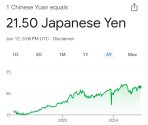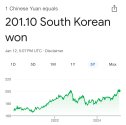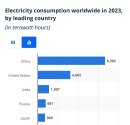But China can already do this. It has utterly annihilated much of its rivals industries in a way no other country could.It goes beyond that.
Like I said before, the US dollar is not just used by China. Your argument would make sense in a world where only the US and China exist, but that's not the case.
If the yuan were in the dollar's position, China would gain a number of capabilities. It would, for example, be able to enact powerful sanctions regimes against actors it doesn't like - ones that could isolate and crush their economies, depending on the actor.
What's the point of bullying a nobody like NK? In fact I guess China is bullying India at the moment, and it's working, life is shit in India and India continues to be the same in 2025 as in 2015, 2005 and so on. India is a hell lot more powerful than NK. And unlike NK who is still raring for a fight as ever, India is actually forced now to make amends.
That's not desirable without a follow up plan to actually get rid of the separatists.Taiwan could be turned into a pariah state over night, with international commerce effectively cut off.
There is no substitute for clearing the hostiles with arms.
No, although China has the ability to enact these sanctions (even with something as simple as diverting shipment to other provinces), what it would do is to make tons of Taiwanese lose their money, become homeless etc and so on. Resulting in a robust class of ruined lives whose only hope to for normalcy or even glory is to fight for separatism.All China would need to do is indicate it won't transact with any country that does business with Taiwan. Taiwan would become like North Korea, and its pampered population would flee or riot. This same power does not exist right now, since the threat of Chinese sanctions isn't sufficient to get the rest of the world to stop doing business with Taiwan, as long as the US allows it.
That's what we saw with the Donbass people after Ukraine enacted these "tough" policies on them. It only made things much worse for Ukraine.
This is an insidious cope but quite hilarious on close examination by countries stuck in income traps that aren't progressing.Of course, these capabilities also come with costs - loss of export competitiveness prime among them, since the yuan would have to appreciate against every other currency until it is effectively over valued. The US has found loop holes around this - subsidies, unequal tariffs, and monopolistic take overs of foreign competitors - but it'd have to be targeted. You can't, fundamentally, operate an exports based economy with a reserve currency.
Historically, the US has played its role to its advantage by doing a lot of the right things you'd want to do with an over valued currency. For instance, enacting brain drains on the rest of the world, and weaponizing its consumer and financial markets to force its vassals into submission. It created powerful and vast dependency chains where governments simply could not imagine extracting themselves from the US, lest they crash their economies and are overthrown. The emphasis on "democracy" and "popular will" - supported by sophisticated intelligence and media operations - are all components of this larger strategy, and it worked.
But the US made - or was forced to make - a key mistake: it got soft. Not in the military sense, not in the sense of being ruthless, but as the inevitable consequence of abundance and prosperity. As they say, great times create weak men; and weak men indulge in decadence. When the entire culture of a country shifts towards decadence, it is difficult to keep any strategy - no matter how sound - running effectively. After all, at the end of the day, policies are executed by people, and if the people executing these policies are corrupt and incompetent, then nothing can be done.
That is the situation the US finds itself today - Americans have become too complacent, ignorant, and generally incompetent to run the system their fathers created. They have become sheep, and winter is coming. It is precisely this aspect of American culture that people like Trump and Elon are trying to change. Too late, probably, but it won't stop them from trying.
All of which is to say, pretending that the US strategy is terrible and that China is right to focus on devaluing its currency - and thus the value of its people's labor
"devaluing people's labor" yeah, that's what happens when a society advances.
A shirt used to be made by a seamstress over dozens of hours and therefore represented valuable labor which could be sold for maybe a week or a month's wage. When Britain invented textile mills, the same shirt can be made in huge bulk and anyone can get the shirt for maybe a day's wage at most.
Thus, the labor value of the British seamstress was devalued compared to the artisan foreign (say Qing or Maharati) seamstress handmaking everything.
You see it sounds good for propaganda when you say people's labor is devalued, but what it really means is that people are getting more of everything, at a greater value than ever before. When formerly expensive products are "devalued", it lets a civilisation advance towards new top tier products. And in turn, that gives them time to focus on building/researching the flashy stuff, like rifled cannons and dreadnoughts for Britain and J-36s, robotics or whatever for China.
China is still objectively larger if we're speaking gdp. And while government budgets are hard to measure, it's fairly obvious which one conducts greater spending and can outbid the other. China has a restrictive immigration policy, so comparing this is pointless, they don't want a ton of H1B walking mouths, no matter how high iq or what prestigious third world universities they are from on paper, China has confidence that it's own workers/engineers/inventors are far better.- is missing the forest for the trees. China's strategy may prove to be the better strategy, long term, but the verdict is still out. End of the day, the US economy is objectively larger based on global market value, and this allows it to do a number of things, like attract global talent and investment in a way that China never can, threaten/sanction countries into submission, gather vast quantities of vassals, buy / hollow out other countries' most valuable sectors, and out bid China in the global resources trade. But it also does come with draw backs, like not being able to run a manufacturing-based economy and creating import dependencies.
And who are we to argue with that? Economy size speaks for itself. Science publications speaks for itself. Dominance in so many market sectors speaks for itself.




